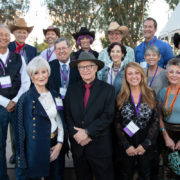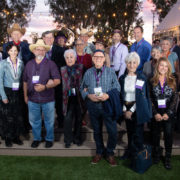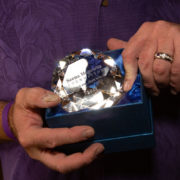After a 14-month battle, we are heartbroken to announce the passing of our dear friend and Warrior Nate Prewitt to pancreatic cancer. “Your smile lit up the room. Your strength lifted buildings. Your friendships and bonds were immediate. You will always be remembered and admired for your inspiration to so many.
When asked about his cancer diagnosis, Nate once said, “I think people sometimes struggle with, ‘Why me?’, and acceptance is a big part of it – accepting that God has a role for all of us,” he said.
Rest in Peace and Comfort, Nate. You will be missed.
Read Nate’s Original Warrior Story Below
Most otherwise-healthy men and women wouldn’t consider themselves “lucky” after suffering a stroke, a seizure and a severe coronary blockage in quick succession, but in the case of Arizona’s Nate Prewitt, his sudden health scares proved a blessing in disguise.
The successful Scottsdale businessman had always led a healthy, active lifestyle, so it came as a complete surprise when he suffered a stroke followed by a seizure in late November of 2017, requiring intubation for three days. He pulled through, however, and he worked on building back his strength until the spring of 2019, when he began experiencing concerning symptoms, including shortness of breath.
When he sought treatment, doctors determined he had a severe, 95% blockage in part of his heart, and he underwent triple-bypass surgery to correct it. By mid-summer, he had largely recovered from surgery and was feeling more and more like himself when, suddenly, he began experiencing headaches, backaches and other flu-like symptoms. During a routine follow up visit to his primary care doctor, a CT scan was ordered, which revealed lesions on his liver and a mass in his pancreas.
Nate’s stage four pancreatic cancer diagnosis quickly followed in early October of 2019. “It’s very shocking,” he said, noting that things moved quite quickly in the weeks to follow. Nate’s wife, Melissa Blake, is the Vice President of Major Gifts at Scottsdale’s HonorHealth and arranged a consultation for her husband with Dr. Michael S. Gordon, one of several HonorHealth oncologists known for pioneering new treatments for cancer patients in partnership with the Translational Genomics Research Institute.
Additional biopsy and scan work revealed five lesions on Nate’s liver and an 18-mm lesion on his pancreas.
“Within days, I was getting my first treatment,” he said, adding that he also became a participant in clinical trial at the HonorHealth Research Institute in Scottsdale, Arizona: The trial, which involves a combination of Nab-paclitaxel, Gemcitabine and Cisplatin; and a high-dose Vitamin C therapy study.
“I struggled to find my equilibrium at first,” Nate said, of adjusting to his treatments. “But lately, I’ve been hunting, I’ve played golf – I’ve been feeling great.”
“It’s incredible to meet people going through the same thing who are living normal lives,” he said. “It’s a real shot of confidence and can really lighten the load.”
Currently, between work, family and treatments, Nate keeps himself quite busy, and he credits a positive attitude with helping him continue to face each day with drive and determination.
“I think people sometimes struggle with, ‘Why me?’, and acceptance is a big part of it – accepting that God has a role for all of us,” he said. He also noted that, had he not already undergone treatment for his stroke and his heart problem, his body might not have allowed him the strength he’d needed in recent months.
“Looking back, had I not had that stroke and heart blockage, I wouldn’t be in any position to carry on the fight I am now.”










